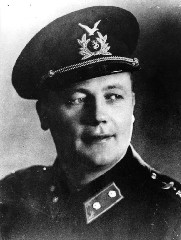Ruben Oskar Auervaara facts for kids
Ruben Oskar Auervaara (born September 4, 1906 – died May 26, 1964) was a famous Finnish trickster and thief. He became well-known for cheating money from women. He met them through newspaper ads, pretending he wanted to marry them. His last name, Auervaara, is now used in Finland to describe a charming person who tricks others.
Auervaara spent a total of 26 years of his life in different prisons.
Contents
Biography
Ruben Oskar Jansson was born in Turku, Finland. His father was Johannes Jansson, a factory worker, and his mother was Anna Karlsson. When he was young, he worked as a bellboy at the Phoenix Hotel.
After finishing elementary school, he was sent to a special school because of his bad behavior. He ran away from this school many times. He started committing small crimes and was sent to prison for the first time when he was only 16 years old.
In 1935, he changed his last name from Jansson to Auervaara. This is when he started his career as a conman, tricking women. He used many fake names to do this. He was sent to prison many times, spending a total of 26 years there.
Auervaara looked for women to trick by placing announcements in newspapers. He tried to steal everything he could from them. He made his stories seem real by using fake photos. For example, he would have his picture taken in a pilot's uniform. He might pose in front of someone else's car, claiming it was his own. He even played a hotel piano, pretending the hotel lobby and piano belonged to a mansion he owned.
He was found guilty of tricking twenty women. Auervaara chose women who he thought were the richest and easiest to fool. Many of his victims had a good education. The court cases about his actions got a lot of attention in the newspapers in the 1940s and 1950s.
Unto Parvilahti wrote in his book that he met Auervaara in prison in 1944. Parvilahti said Auervaara was a "small, rather ordinary-looking man." Because of this, it was hard to believe he was so successful with women. However, Parvilahti also said Auervaara was "always happy and good with words."
Parvilahti usually did not write documents for other prisoners. But he agreed to write Auervaara's defense document. He was curious to see how the charming conman would defend himself. Parvilahti noticed that Auervaara's handwriting and Finnish grammar were not very good. This was surprising since he had made successful contacts by writing letters. In return for the writing help, Auervaara cleaned Parvilahti's cell. He also gave him cigars and flower bouquets. The bouquets came from women Auervaara had tricked.
Auervaara became famous in January 1945. The police published his photo and asked his victims to come forward. A doctor who studied criminals said Auervaara was a skilled actor. He had trouble controlling himself and did not feel emotions deeply.
When he was not in prison, Auervaara spent a lot of time in the islands.
One time, while on his way to a mental health check, Auervaara escaped to Sweden. He continued to trick people there. He was soon caught again and sent to prison. He tried to escape three times but failed each time. After serving his sentence, he was sent back to Finland. There, he had to finish his remaining prison time.
He later changed his name again. He also published a book about his life called Nainen on kohtaloni ("The woman is my fate"). Auervaara, now called Karnas, continued his tricks. He was accused of a serious crime after one of his victims died. In 1956, he was sentenced to forced labor. The court saw Auervaara as a danger to public safety.
After Auervaara was released from prison in 1959, he took back his original last name, Jansson. He also finally got married for real. It seemed Auervaara was trying to change his ways. However, he was arrested again for tricking someone in a marriage in spring 1964. On May 27, 1964, Auervaara was found dead in a police cell in Helsinki.
Reputation
In newspapers, the word "auervaara" is sometimes used to describe crimes where women are tricked with promises of marriage. This has also led to the word "auervaarailu" (meaning "acting like an Auervaara"). This is an old-fashioned term for tricking women.
According to doctor Hannu Lauerma, Auervaara often acted like a shy, inexperienced boy to women. He would tell them he was timid and afraid of women. This way, Auervaara appealed to the women's caring side. He pretended to need their help. Auervaara's way of tricking people was a natural talent. He made it even better through experience.
Auervaara is thought to have inspired the 1945 play Gabriel, tule takaisin ("Gabriel, come back") by Mika Waltari. This play is about a conman who chases the money of older single women and widows. However, when Waltari wrote the play, Auervaara was not very well known yet. In his own book, Nainen on kohtaloni, Auervaara said he was the inspiration for Waltari's play. He even said he was not as heartless as Waltari made him seem.
Veikko Lavi wrote and sang a song called "Gabriel" about these events. Auervaara was also joked about in some songs by Reino Helismaa. One song said, "I used to have a sweetheart, but not anymore / Auervaara took her from me before the wars." Another song said, "I am a gentleman and will never touch women / and I will never sink to Auervaara's level."
Sauvo Puhtila's Finnish translation of the Swedish Eurovision song Kevätauer has a line that sounds like "when the spring mist brings danger" or "when the spring brings Auervaaras."
See also
- Minna Craucher
Literature
- Auervaara, Ruben Oskar: Nainen oli kohtaloni. Hämeenlinna, 1953.
- Kautto, Timo: Auervaara: Aurinko- ja kevätmies. Helsinki: Edita, 1999. ISBN: 951-37-2800-5.


